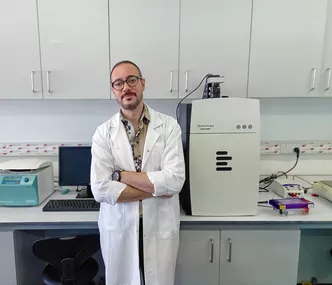News
WHAT'S

ASSOC. PROF. KEREM TERALI: “IN ADDITION TO VACCINES, WE ALSO NEED ANTI-COVID-19 DRUGS”
While the COVID-19 pandemic continues to affect the whole world, scientists continue their work without interruption to cope with the disease.
Assoc. Prof. Kerem Teralı, who is the Head of Medical Biochemistry Department at Girne American University (GAU) Faculty of Medicine, made important statements about both non-vaccine therapeutic interventions in COVID-19 and the scientific studies they carry out in the TRNC.
Assoc. Prof. Kerem Teralı answered the questions about the drugs that can be used against COVID-19 as follows:
What is the importance of drugs in the fight against COVID-19?
Although it has been proven by phase III clinical studies conducted in various countries of the world that COVID-19 vaccines reduce hospitalization and death rates, we are already witnessing that vaccinated people can also become infected and transmit the virus. While this is the case, it is an undeniable fact that in addition to vaccines, we also need drugs that can help us control the SARS-CoV-2 infection. This is exactly why scientists have been trying to find anti-COVID-19 drug(s) for about a year and a half without a break.
How do these drugs work?
These drugs act by disrupting the structure and/or function of certain proteins, which we refer to as therapeutic targets. Today, many proteins associated with COVID-19 have been identified. Some of these are responsible for the virus infecting cells, while others are responsible for the virus to multiply inside the cell. For example, the ACE2 receptor is a protein found on the surface of some human cell groups, such as lung cells, that facilitates the attachment of the virus to the cell membrane and entry into the cell. Apart from human proteins, viral proteins can also be a therapeutic target to prevent COVID-19. The 3C-like main protease and RNA-dependent RNA polymerase of SARS-CoV-2 are the leading proteins in this group and the most studied proteins.
Can you tell us a little about your own work?
In our article published in the “Journal of Molecular Graphics and Modeling” in November 2020 and included in the “Public Health Emergency Collection” of Elsevier Publishing, we scanned more than seven thousand clinically approved molecules in the virtual environment using advanced combined methods and found eight different drugs that can possibly inhibit ACE2’s interaction with SARS-CoV-2. While these drugs can benefit us in this fight against COVID-19 on their own, they can also be used in the discovery of new and more effective molecules with chemical modifications. Besides our article was the most cited original research article originating from Northern Cyprus, we were very pleased that our hypothesis was accepted by the scientific community.
What is the advantage of screening for drugs available on the market?
As you will appreciate, time becomes very precious to us when we are struggling with a pandemic. It takes an average of ten years to launch a drug designed from scratch in today’s conditions. Thanks to an approach that has been on the rise in recent years and called “drug repositioning”, this period can be shortened considerably. Underlying this approach is the principle of reconsidering a drug that is already safely used for another indication to serve a new purpose—for example, the prevention of SARS-CoV-2 infection, as here. We also took this approach and identified the ACE2 receptor as our therapeutic target.
What do you think should be done in the future?
The effectiveness of the drugs recommended by us and other research groups should be tested using cell culture and/or animal experiments, and the drug or drugs that give the best results in the tests should be brought to the bedside treatment service quickly. In addition, new vaccines that can be effective against variants that spread globally and cause concern should be prepared and these vaccines should be administered to individuals as the third and, if necessary, the fourth dose. In addition, another issue that is at least as important as what I have counted is that individuals must strictly follow the mask-distance-hygiene rule. Minimizing the circulation of the virus between humans will also slow the rate at which new and more dangerous variants appear.


